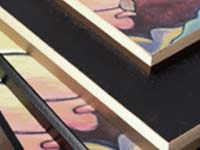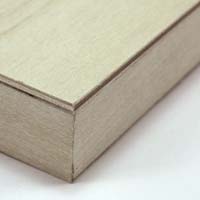| Glossary Of Giclee Terms
[17] |
B
Backing Board A backing board is a rigid support material used to provide structural stability and protection to Giclée prints when framing or displaying them. Typically made from materials like foam core, cardboard, or archival-quality paperboard, backing boards prevent prints from warping, bending, or sagging over time by providing a flat, even surface for mounting. Additionally, backing boards help to isolate prints from external factors like moisture, dust, and handling, preserving their integrity and prolonging their lifespan. |
Baltic Birch Baltic Birch Plywood is the leading plywood that is light in color with fine grain patterns. Its high durability and resistance is its strength, preventing warpage and blending.
A Baltic Birch Plywood is made of a strong material due to the usage of high-quality MR for veneer gluing. It is one of the most sold products for its long durability, low weight, surface hardness, quality, and high performance.
|
| Banding Banding refers to a visual artifact that may occur in Giclée prints, characterized by noticeable bands or stripes of inconsistent color or tone across the printed image. Banding typically results from issues during the printing process, such as clogged printheads, uneven ink distribution, or insufficient resolution settings, leading to irregularities in color gradient transitions. To minimize banding and ensure smooth, uniform printing, printers employ techniques like nozzle cleaning, color calibration, and proper maintenance of equipment to achieve optimal print quality. |
| Base Color In Giclée printing, the base color refers to the underlying color of the printing substrate before any ink is applied. The choice of base color can influence the appearance and characteristics of the final print, affecting factors such as color accuracy, contrast, and texture. Common base colors include white, off-white, and various shades of gray, each imparting different qualities to the printed image and contributing to the overall aesthetic effect. |
| Base Paper Base paper refers to the primary substrate or material onto which the image is printed in the Giclée process. It serves as the foundation for the printed artwork, providing support, texture, and durability. Base papers for Giclée printing come in a variety of types and finishes, including matte, glossy, satin, and textured surfaces, each offering unique qualities that can enhance the visual impact and longevity of the print. |
| Bevel/Bevelled Edge A sloping edge common on picture frames and linen liners. Generally, the approximately 45 degree slope begins at the top of the lip of the frame and slants in toward the artwork (see image). |
 |
| Bezel In the context of Giclée printing and display, a bezel refers to the frame or border surrounding the viewing area of a digital screen or monitor. Bezels are commonly found on devices such as computer monitors, TVs, and digital photo frames, where they serve both aesthetic and functional purposes. Bezels can vary in size, material, and design, influencing the overall appearance and usability of the device. |
| Bit Depth Bit depth, also known as color depth, refers to the number of bits used to represent each pixel in a digital image. It determines the range of colors that can be reproduced in the image, with higher bit depths allowing for more shades and nuances of color. In Giclée printing, images with higher bit depths typically result in smoother gradients, better color accuracy, and finer detail reproduction, resulting in higher-quality prints with greater visual fidelity. |
| Black (cmyk) In the CMYK color model used in printing, black (K) is one of the four primary ink colors, along with cyan (C), magenta (M), and yellow (Y). Black ink is used to create rich, deep shadows and textural details in printed images, enhancing contrast and definition. By combining varying amounts of cyan, magenta, yellow, and black ink, printers can achieve a wide range of grayscale tones and reproduce images with greater detail and accuracy. |
| Black Point In digital imaging and printing, the black point refers to the darkest level of black that can be reproduced in an image or print. It represents the minimum intensity of black that the system or device is capable of producing. Maintaining a true black point is crucial for preserving shadow detail and contrast in printed images, ensuring that dark areas appear rich and well-defined without losing important visual information. |
| Bleed Printing Bleed printing is the process of printing an image or design with bleed, where the ink extends beyond the intended trim edge of the printed piece. This technique is often used in Giclée printing to produce full-bleed prints, where the image or design seamlessly extends to the edge of the paper without any white borders. Bleed printing requires careful setup and trimming to ensure that the final prints have clean, uniform edges and maintain the integrity of the design. |
Bond Paper Originally used in preparing government bonds, this type of paper is of high quality and quite durable, generally having a paper weight of more than 50 g/m². In the printing business, this paper is used to produce important documents, or may be used as a lower-cost option to light fine art papers, for producing artistic reproductions.
Bond paper may be used to create original artworks using pen, ink, or pencil, and is sometimes made from rag pulp, which creates a stronger paper with a distinct texture. |
| Borderless Printing Borderless printing is a printing method where the printed image extends all the way to the edges of the paper or substrate, without leaving any white borders. In Giclée printing, borderless printing is achieved by adjusting the printer settings to allow for full-bleed printing, ensuring that the image covers the entire printable area of the paper. This technique is commonly used to create prints with a seamless, edge-to-edge appearance, particularly for photographs, art prints, and other visually impactful designs where borders would detract from the overall presentation. |
Box frame An option for a dry mounting base; a wood board with a wood frame behind to achieve the look of an unframed canvas without the canvas. The result is a sturdy decorative piece with a matte or shine finish. A choice of depths is generally available.
Purchase box frame custom wood panels directly from our website. |
 |
| Bristle Bristle refers to the stiff, coarse hairs or fibers used in traditional painting brushes. In Giclée printing, bristle textures can be digitally simulated or incorporated into the printing process to mimic the appearance and texture of brushstrokes in traditional artwork. Bristle textures add depth, dimension, and tactile quality to printed images, enhancing their realism and artistic appeal. |
| Bronze Bronze is a metallic alloy composed primarily of copper and tin, often used in sculpture and fine art. In the context of Giclée printing, bronze may refer to the reproduction of metallic textures or colors in printed artwork. Specialized printing techniques can simulate the appearance of bronze, incorporating metallic inks or finishes to create prints with a lustrous, metallic sheen reminiscent of bronze sculptures. |
| Butting Butting refers to the alignment of printed images or elements so that they meet or about each other without overlapping. In Giclée printing, precise butting is essential for creating seamless joins between adjacent printed panels or sections, particularly in large-format prints or multi-panel artworks. By ensuring accurate alignment and registration of printed elements, butting helps maintain the integrity and continuity of the printed image, resulting in a cohesive and professional-looking final product. |
|

|



|
USA Giclee On Canvas, Fine Art Printing - Art Scanning & Reproductions - Handmade Oil Paintings - Custom Wood Panels, Metal Picture Framing - Block/Plaque Mountings, Large Format Dry Mounting & Lamination - Art Supplies: Stretcher Bars, Cradled Wood Panels and Artist Canvas - Collages On Canvas - Plexi/Acrylic Face Mounts - Block Acrylics, Fabric Printing, Dye Sublimation - Cityscape Skyline Prints, Resin, Photo Gifts and more...
|
|
© 2002-2025 - KeenART Media Ltd.
|
|
| |
|
